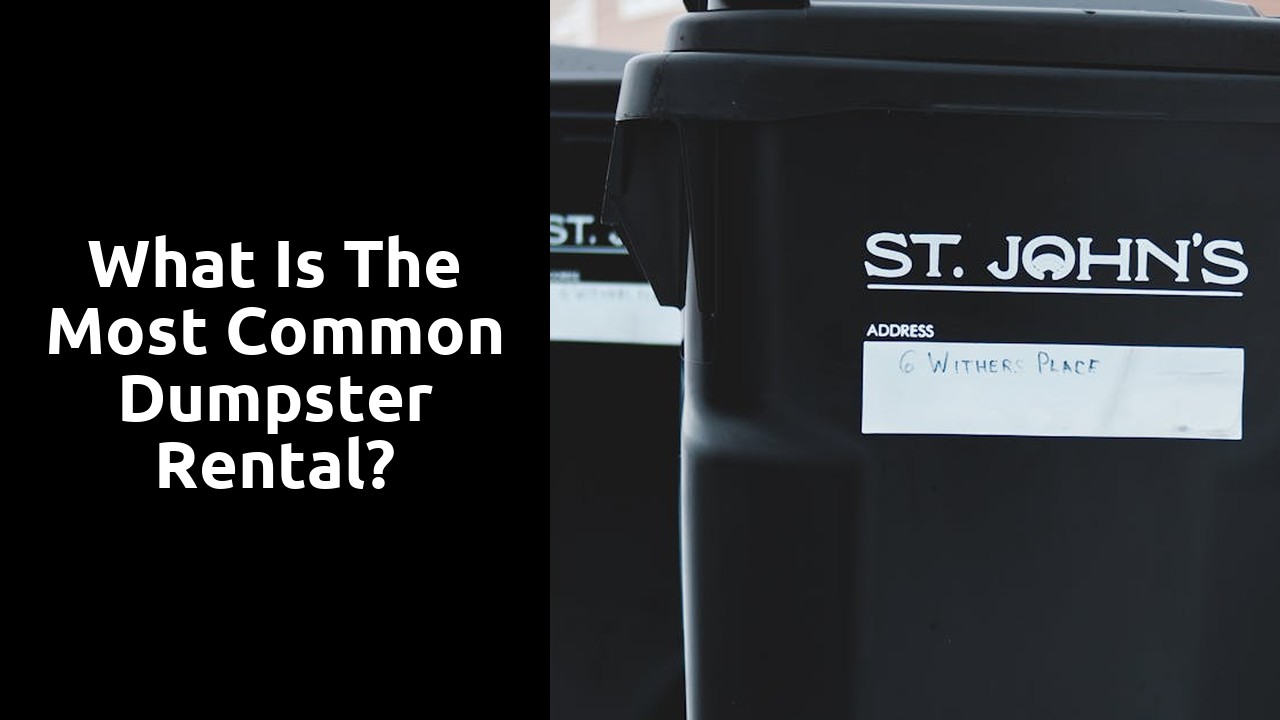What is the most common dumpster rental?

Table Of Contents
Selecting the Right Dumpster Size
Choosing the appropriate dumpster size is crucial for any project. The size must accommodate the volume of waste generated without causing overflow or unnecessary costs. Most companies offer a variety of sizes, typically ranging from 10 to 40 cubic yards. Smaller options, like 10 or 15 yards, often suit residential cleanouts or small renovation projects, while larger sizes handle substantial construction debris or large-scale cleanouts.
Understanding the nature of the debris also plays a significant role in selecting the right size. For lighter materials such as yard waste or small furniture, a smaller dumpster may suffice. Heavier loads, including concrete or dirt, typically require more robust options to ensure safety and compliance with weight limits. Assessing the project scope and estimating the waste volume ahead of time can help in making an informed decision.
Guidelines for Estimating Volume
Understanding the volume of waste generated is crucial for selecting the appropriate dumpster size. Start by assessing the type of materials you plan to dispose of. For instance, bulkier items like furniture may require more space compared to compact debris such as soil or shingles. It is beneficial to estimate the total volume by measuring the dimensions of large items and considering how much waste will be generated throughout the duration of your project.
Next, consider calculating cubic yards. A standard dumpster typically measures from 10 to 40 cubic yards, catering to different types of projects. If unsure, a 20-yard dumpster is a common choice for home renovations, cleanouts, or medium-sized construction jobs. Having a basic understanding of your project's requirements can streamline the process and prevent overpaying for unnecessary space or underestimating your needs, which could lead to additional trips to the landfill.
Comparing Local Dumpster Rental Companies
When selecting a dumpster rental company, it is important to assess the range of services offered. Different companies may specialize in various types of waste disposal, which can influence pricing and availability. An often overlooked aspect is the company’s reputation and reviews from previous customers, which provide insights into reliability and customer service. Researching these elements will help ensure a smooth rental experience.
Pricing structures can vary significantly between providers, making it essential to obtain and compare quotes. Some companies charge a flat fee, while others may include additional costs for weight overages or extended rental periods. Transparency regarding any potential fees is crucial to avoid unexpected expenses. Additionally, understanding delivery and pickup options can greatly influence convenience and planning for your project.
Criteria for Evaluating Providers
When choosing a dumpster rental provider, several key factors come into play. Start by examining the company's reputation within the community. Reading online reviews and testimonials provides insight into customer satisfaction. Consider the range of services offered, as some providers may specialize in certain types of waste or projects. A well-rounded company can accommodate various needs, which is beneficial for different projects.
Pricing is another important aspect to evaluate. Gather quotes from multiple providers to ensure you are receiving fair rates. Pay close attention to additional fees that may not be apparent at first. Assessing the ease of communication with the company can also help gauge whether they are organized and reliable. Prompt responses and clear, helpful information from customer service represent a good sign of provider quality.
Environmental Considerations
Proper waste management plays a crucial role in minimizing the environmental impact of various disposal methods. Many dumpster rental companies offer eco-friendly options that ensure recyclable materials are sorted and processed correctly. By collaborating with providers committed to sustainable practices, individuals and businesses can contribute positively to waste reduction efforts. Recognizing the importance of recycling and responsible waste disposal fosters a cleaner, healthier environment.
Educating customers about the significance of waste segregation can further enhance environmental efficacy. Encouraging the disposal of hazardous materials in designated containers prevents contamination and promotes safety. Choosing rental companies that prioritize environmental responsibility guarantees that disposal methods are compliant with local regulations. Awareness and proactive participation in responsible disposal practices can lead to substantial ecological benefits in the long run.
Responsible Disposal Practices
Responsible disposal practices are essential for minimizing the environmental impact of waste management. Many rental companies offer guidance on what materials can safely be placed in their dumpsters. Common hazardous items such as batteries, chemicals, and electronic waste require special handling and should not be disposed of in standard dumpsters. Following local regulations helps avoid penalties and contributes to community well-being.
Recycling is a critical component of waste management that enhances sustainability efforts. Many dumpster rental services provide options to sort recyclable materials from regular trash. This can include paper, metal, cardboard, and certain plastics. Educating yourself on local recycling guidelines allows for a more responsible disposal approach, fostering a cleaner environment for future generations.
FAQS
What is the most common dumpster rental size?
The most common dumpster rental size is typically the 10-yard dumpster, as it is versatile enough for various projects, including small renovations, yard clean-ups, and decluttering.
How do I estimate the volume of waste I need to dispose of?
To estimate the volume of waste, consider the type of project you're undertaking. For example, a small bathroom remodel may require a 10-yard dumpster, while a larger home renovation might need a 20 or 30-yard option.
What factors should I consider when comparing local dumpster rental companies?
When comparing local dumpster rental companies, consider factors such as pricing, availability, customer reviews, the range of dumpster sizes offered, and any additional services they provide.
How can I evaluate the reliability of a dumpster rental provider?
To evaluate a dumpster rental provider's reliability, check online reviews, ask for recommendations from friends or family, and inquire about their experience, response times, and customer service policies.
What are responsible disposal practices when renting a dumpster?
Responsible disposal practices include ensuring that only acceptable materials are placed in the dumpster, recycling whenever possible, and adhering to local regulations regarding hazardous waste disposal.